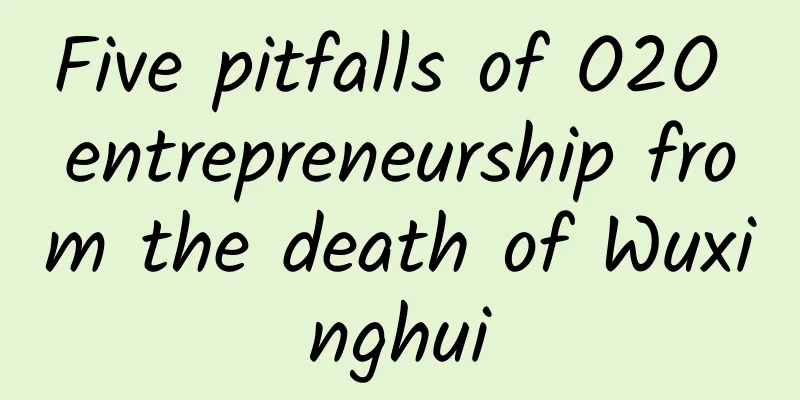Five pitfalls of O2O entrepreneurship from the death of Wuxinghui

|
It is hard for O2O not to be popular! On March 5, 2015, in the 2015 Government Work Report, Premier Li Keqiang mentioned for the first time that "new consumption that uses the Internet as a carrier and interacts online and offline will flourish." This is the first time that a Chinese Premier has mentioned encouraging O2O online and offline interactive consumption, which will promote the currently popular O2O industry. In the case of a bright O2O situation, I am not pouring cold water on O2O. I would like to share my views on O2O entrepreneurship based on my personal entrepreneurial experience. Five Star Hui, the largest travel industry startup in 2013, was formed by a team of star serial entrepreneurs. The tourism industry veteran Qi Qi invested in the angel round, and IDG and CDH invested 3 million US dollars in the A round. In the second half of 2014, it officially entered liquidation. In the spring of 2015, the remaining team was merged by Youxin Travel. The end of 2013 was the most glorious time for Five Star Hui. As a company that Taobao Travel has strategically supported, it also created a performance of selling 1,000 US routes a day. Taobao Travel employees always talk about Five Star Hui. The industry rumor (the time is not right) that Taobao Travel will establish a separate brand (later Go A) and the news of 20 million US dollars of investment in Five Star Hui is also a hot topic. A year has passed. Why did Five Star Hui, which was not without opportunities, fall to the point of liquidation and sale? History is a mirror that can help us understand the rise and fall of things. This article starts from the decline of Wuxinghui and explains the pitfalls that the current super hot O2O startups should pay attention to. Ken1: Underestimate technology in the long term and overestimate technology in the short term Many travel companies started up in 2013, ushering in the first year of independent travel. The best of them include "Yao Chufa", "Wuxinghui", "Shijiebang", "Love Travel", "Lai Lai Hui", etc. Among them, "Wuxinghui" is the most promising. In 2013, Wuxinghui was the first to launch a product called "Ten Thousand Yuan Tour to the United States". With the strong support of Taobao, it achieved a crazy sales performance of one thousand orders a day. Just like "Yaochufa" which was strategically supported by Meituan, all these companies (except Wuxinghui) are sales companies without exception. There is nothing wrong with being a sales company. Technology will not play a big role in it. This is very similar to the popular O2O companies nowadays. However, if technology is underestimated for a long time, it will face huge problems. In the face of technology, all business models are paper tigers. I understand this sentence as, no matter how good the business model is, if the technology collapses, it is all shit. Tourism is an industry with very low technology content. Which travel company on the market is not aggressively promoting its products on the ground, which one is not trying hard to find channels to attract traffic, and which one is not relying on technology to innovate the tourism industry. Ctrip, which does telephone sales, started out by issuing cards at the railway station; Qunar, which is an air ticket agent, compared prices and relied on the policy relaxation. Many travel hotels, air tickets, tickets and other companies do not have full-time product technology at all. In the chaotic market, they just find one or two suppliers, get some cheap goods, and sell them on Taobao and Meituan. In fact, it is no different from selling clothes and shoes on Taobao. It is very easy for O2O startups to find a part-time or outsourced team to make an app that is often patched up, and then start financing, promoting it, and advertising. This is not wrong, but then, they still rely on a small amount of rookie technology or still rely on outsourcing to maintain the technology platform. This is the beginning of a big mistake. Let's take a look at the story of Wuxinghui. Due to technical failure, Wuxinghui fell into a dilemma. Wuxinghui was founded a long time ago, and later turned to high-quality, low-priced free travel. It should have a very good accumulation of technical talents. In 2013, Taobao Travel supported Wuxinghui as an important merchant, subsidizing it with 80 yuan in cash for each order, and opened a technical interface so that Wuxinghui could use the internal background to manage orders, inventory, and goods. However, at the peak of orders, Wuxinghui's technology collapsed for a whole week. In an instant, the hard-won customers turned into customer complaints, orders brought bad reviews, and countless orders were returned every day. Wuxinghui's industry reputation and Taobao rating plummeted. Taobao's Xiaoer, who usually only dared to take some red envelopes and operate the free advertising entrance, did not dare to get into trouble in the face of this situation. Abandoning outsourcing, Didi is on the right track. A few days ago, I talked with people from Didi Taxi about why Didi stood firm and developed among so many companies that developed at the same time. The Didi colleagues said that the key in the early and middle stages is still people, two types of people. One is technology. Cheng Wei gave up outsourcing development and invested in the technical team to lay the foundation. In the past few years, Didi has faced sudden huge traffic and orders countless times, and there has been almost no problem. The other is ground promotion, opening a city in one to two weeks. In addition to eliminating the bottleneck of O2O expansion (for example, eliminating the need for store managers), it can quickly penetrate a city. Supporting both ends of the platform is the biggest challenge for the development of O2O entrepreneurship. Didi did it and succeeded. Examples of short-term overestimation of technology are more common in the entrepreneurial circle. Now many people hope to subvert the tourism industry through technological innovation. For example, a friend from Air China started a business to do a project to combine air ticket routes, claiming that the search he did was more satisfactory for free travel and could be reduced to more suitable transfer routes. This is obviously an overestimation of technology in the short term. With the profit of air tickets, you can count on your fingers 7 ways to make money (recently there is one more way, which is to send text messages that the flight cannot take off and cheat the money back for the change of flight). This seemingly glorious technology has affected the cake of air ticket suppliers, the vested interests of tail goods sellers, and the interface income of Air China, and it is difficult to meet the needs of a small number of backpacker users. This technology should still be started within Air China and mixed into scientific research topics. Many young people who enter the industry will make such mistakes: short-term overestimation of technology, hoping that the technology or model will explode like a "secret APP" and completely change the O2O industry landscape. Even "World Bank" with a senior team background still makes similar mistakes, hoping to subvert the entire industry through technology integration, technology recommendation, and technology platform. Technology, especially in the Chinese market environment, is a foundation, just like an elementary school teacher. You cannot underestimate it, but don’t expect it to help you achieve subversion. Ken2: Explosion without quality control ability I started with Fengche.com, started an overseas travel business, joined a travel agency, and then started a "disguised hotel discount" business with my friends. I have been in the travel industry for almost 3 years. In 2014, I resolutely left the travel industry and started to enter the wedding photography industry, and founded "Jiapai". Many friends asked me why I left the travel industry and made such a big transition? When I think about it, it is very difficult to control the service in tourism. It is basically about playing with traffic and resources. This is the key to my leaving the tourism industry. It was the failure of Wuxinghui that made me realize this. Tourism is still about playing with traffic and resources, and lacks the ability to control overall quality. Wuxinghui started to launch the Hong Kong free travel product in August 2013. The product is very simple and cost-effective: from anywhere in China to Hong Kong, Air China flight + Hong Kong five-star hotel only costs 1999. Wuxinghui has tasted the sweetness of American products, and it seems that Wuxinghui is the Xiaomi in the tourism industry. Super high quality: five-star aircraft + five-star hotel combination; super low price: the first domestic American free travel product under 10,000 yuan. Wuxinghui has already started to sell Hong Kong free travel products on a large scale before confirming air tickets and hotels. Relying on the large number of orders in hand, it controls hotels and flights. In the service industry, the most important thing is the quality control of the service, which is to deal with the details when problems arise. In the tourism industry, basically everything has to go through many levels of transfer, and what faces the user is no longer service, but sales. For sales, what they need is traffic, conversion rate, and customer unit price and customer unit profit. Service is not something they will consider at all, let alone improvement. With the rise of O2O, many platforms connecting craftsmen and users have gradually emerged. Their platforms are very simple, they make an app, attract a group of craftsmen online and offline, and then start to hype that they can provide super awesome "door-to-door" services and super awesome Internet products. The instigator should be the nail art company "Beaver Home", which is doing pretty well. Many companies doing O2O have learned the different dimensions and methods of "Beaver Home" and have tried their best to hype it, but they have not learned its control over quality. Some details, such as Beaver Home's nail artists, are not allowed to use the "bathroom" of the customer's home no matter how long they do the nail art. For users, no matter what your business model is, if I pay a penny, I should enjoy genuine service. I can try your innovations, but I will not spread bad service. A team has developed a "shooting appointment" product that connects photographers and users. They have recruited a large number of photographers and provided users with "online photographer appointment" services. However, they cannot provide full service control, and such a platform is just a temporary innovation. Let's think back to Yahoo more than 20 years ago. Didn't it do the same thing? But at that time it was not called O2O, but "local yellow pages", and it was not in the form of an app, but a web form. Ken3: I got the wrong rhythm when starting my own business Nowadays, when starting a business, everyone is talking about the wind. Many people misunderstand this wind as the direction, but I personally understand it as the timing and rhythm of starting a business. When the user demand timing arrives, the market is formed; if you follow the right investment and product rhythm, the company will be blown to the sky. Let's first look at the lesson that Wuxinghui has taught us. Wuxinghui did not expect that there would be an explosion of free travel to the United States. In the case of a serious lack of relevant supporting facilities, sales were not fixed on time routes. In the case that the company's own CRM management system, customer service and level were very immature, although these thousands of orders of American products were received, they were immediately overwhelmed. Soon, customer complaints arose, and soon, customers cancelled their orders, and Wuxinghui fell into more problems such as inventory management. In December 2014, I wanted to launch "Jiapai". Our store manager said to me: "Xiaofeng, we are working hard now, but I feel that we are moving too fast. If we collect orders on a large scale now, we may follow the old path of Wuxinghui." After thinking again and again, we finally decided to "provide 50 free wedding photography services" before the Spring Festival. On the one hand, we can improve our system, on the other hand, we can improve our customer service team, and at the same time, we can also polish our products. A good workman does not show his simplicity. When we officially launch, we will provide users with well-prepared high-quality and low-priced products. In September 2012, Didi Taxi was launched and also promoted on a small scale at the airport. However, the product's popularity was still low, and the company's funds could only support it until the end of November. Several founders stood in the shabby office building of Zhongguancun e-World, looking at the taxis on the street, and then looking at their own apps, as if there was no relationship between them, and they were already discouraged. In the next two months, the team focused on adjusting the details of the product and the technical architecture (there was no money to do anything else). In November 2012, an early winter snow became the outlet for Didi Taxi. The number of users and drivers increased dramatically, and Didi successfully completed financing. Too early, Didi would face the problem of burning out money and dying, too late, Didi would face the problem of missing market opportunities or immature products and services. If it was changed to the heavy snow in 2013 or 2014, Didi would have died. Riding on the trend, Qunar made its fortune. Back to the tourism industry, Qunar was not the first to do air ticket price comparison. Before Qunar, there were two companies doing similar things, but the national air ticket policy was not relaxed, and these two companies soon became air ticket agents. After Qunar went online, after half a year of technical improvements and merchant accumulation, the national air ticket agent sales policy was relaxed, and Qunar quickly became a company on the cusp of the trend. In June 2014, I started to look at the wedding photography industry, and decided to enter it in August. I also planned the time points in detail: the product was released in October, 3 million US dollars was raised in November, and it took two months to polish the product. In December, a small-scale test shoot was started to optimize the process. In March 2015, when the wedding photography peak season came, service quality control, money, and the team were ready to provide users with the ultimate service. If you start too early or too late, you will face the problem of survival. Thanks to Wuxinghui, I learned these: the peak and off-peak seasons of wedding photography are the same as those of tourism, and the development rhythm of the entrepreneurial team is also the same. Ken4: Ignoring the essence of Internet brand and reputation Steve Jobs once said: "We humans pursue perfection and share it with others" ( http://www.iqiyi.com/v_19rrh8j3uw.html 57 minutes and 42 seconds). Before the Internet, it took decades or even centuries to create a global brand; after the Internet, it took several years to create a global brand; but after the mobile Internet, it only takes a few months to create a global brand. Innovation can ignite, hype can light up, marketing can detonate, all of which are just using the mobile Internet to shorten the time of brand reputation. However, the establishment of brand and reputation ultimately depends on product quality, the ultimate pursuit of service, and the grasp of the quality tone of the new human beings. At this time, people tend to forget the old Chinese saying "Good news doesn't go out, bad news spreads a thousand miles", and the mobile Internet only amplifies the spread of good and bad news by hundreds of times. Once, my 5-year-old daughter and I bought a toy juicer, which we could use to play the game of squeezing juice, selling juice, and making money. It was very simple to play, and it cost about 10 yuan. We bought two fruits and squeezed two cups of juice, each cup costing 10 yuan, so we could make 40 yuan a day. In the middle, I deliberately asked her if she could buy cheaper fruits, so that she could buy 3 and make more money. She said anxiously: "The juice will not taste good, and no one will buy our juice." I think everyone understands this truth, but they have lost themselves in "marketing hype", "traffic conversion", and "profit margin". Wuxinghui has a good overall brand image and its product packaging is very stylish. It has done elevator advertising at the right time. Its 9999 yuan five-star air ticket + five-star hotel tour to the United States can only be described as perfect. Later, Wuxinghui launched a 1999 yuan five-star tour to Hong Kong, which seemed tempting, but the flight was to Shenzhen and then to Hong Kong, and the hotel was not fixed (isn't this selling cheap fruit?), so people in the south are unlikely to buy it. Only people in remote areas such as the Northeast and Inner Mongolia will be motivated to buy it, but the travel purchasing power and information acquisition ability of people in these places are not high, which leads to problems in the overall operation of Hong Kong products. Now the Tmall store of Wuxinghui has been closed, and several domestic splicing lines have been placed on the website. The situation is very miserable. Looking back at wedding photography, the theme changes every two years. After a period of European luxury, it turned to Chinese classics, and last year and this year it turned to Korean simplicity. Many wedding photography shops have changed their names and continued to do the same thing: sales and secondary consumption, so it is difficult for quality brands to emerge in this industry. In addition, photographers only get a pitiful salary, which will not improve with the improvement of their skills, resulting in a low service level. Many of the emerging photography studios are talented photographers who go out to seek opportunities for self-development. When Fengche was closed for development in Yanqi Lake in the summer, we bought a washing machine for the team to wash clothes. However, the hotel we stayed in did not have a washing machine connection, so I walked for an hour in the middle of the day to the town next door to buy a washing machine connection. I am also a lazy person. When I put the team experience above my personal values, I had such a strong motivation to buy things in the sun. O2O is a service industry and also requires this spirit of considering customers, so in 2014 I entered this industry without hesitation. Ken5: Companies magnify CEO's shortcomings In mid-2012, I wrote an article titled "A Summary of the Failure of Fengche.com" and mentioned Gao's viewpoint: A startup is like a magnifying glass for the CEO, who ultimately decides how big the company can grow and what it will look like. I am most afraid of two types of people: one is the traditional uncle who can't stand the loneliness and wants to start a business, and the other is the nouveau riche executives of large companies who joined after their startups failed and were acquired. For many years, I have been criticizing Baidu. But Baidu has given me a lot. Apart from the accumulation of technical architecture, there is also systematic management training and outlook on life. The two types of people I fear the most are those who have flaws in this aspect. Traditional uncles are not stupid, they also see the subversive charm of the Internet and the O2O approach. However, these uncles generally have a problem: "narrow vision and short legs". Imagine a boss of a traditional travel company who saw an opportunity in travel tail goods and started to organize a team and even registered a company to start a business. Things started out well, with the allocation of sales resources and the organization of supplier resources. But soon, problems arose. The project did not make money for a long time, and the uncle CEO began to organize transformation, reduce investment, and emphasize profit. This is still a small matter. These uncles saw the profit of travel tail goods, but did not see that travel tail goods are just a starting point for revitalization: to establish a high-quality, low-priced brand for free travel. The problem with uncles is: they are jealous, eager to make a move, lack vision, and retreat at any time. The problem with nouveau riche executives is: chaotic management, lack of popular support, and high expectations but low skills (I won’t go into details here, just study uume). Many people ask me why I left the tourism industry? I always answer jokingly that the tourism industry is full of uncles. When Chen Yizhou decided not to start Fengche, William, who was doing personal investment and entrepreneurship at the time, wanted me to bring this product out, including the team and product, and he would be responsible for the first round of funding. This was indeed a relatively big opportunity, but it was still given up. William, who felt that Fengche was the best product he had ever used, found Peng Tao and funded Peng Tao to establish Bread Travel as a seed. Bread Travel continued to advance along this line of thought, with the same fragmented travel sharing, the same high-end APP product, and the same advanced flat UI. Unlike Chen Yizhou's short-sightedness, William took out the second sum of money when Bread Travel encountered development setbacks. Chen Yizhou is a very smart person who can see future trends and draw analogies to summarize rules. But at the same time, he is a short-sighted and stingy CEO, and the company magnifies his problems. Summarize I started Fengche.com in 2011. After going through all kinds of twists and turns, I have a deep understanding of the tourism industry. The failure of Fengche.com and Wuxinghui.com helped me a lot. You can learn a lot from the failure of a business. I hope that the five biggest pitfalls of entrepreneurship that I have sorted out can encourage friends who are or will be engaged in O2O entrepreneurship. As a winner of Toutiao's Qingyun Plan and Baijiahao's Bai+ Plan, the 2019 Baidu Digital Author of the Year, the Baijiahao's Most Popular Author in the Technology Field, the 2019 Sogou Technology and Culture Author, and the 2021 Baijiahao Quarterly Influential Creator, he has won many awards, including the 2013 Sohu Best Industry Media Person, the 2015 China New Media Entrepreneurship Competition Beijing Third Place, the 2015 Guangmang Experience Award, the 2015 China New Media Entrepreneurship Competition Finals Third Place, and the 2018 Baidu Dynamic Annual Powerful Celebrity. |
<<: Why did Apple launch the gold version of the Apple Watch at a sky-high price?
>>: How does the TV industry implement "Internet +"
Recommend
What should we think about when e-sports enters other people’s classrooms?
Recently, foreign media reported that a public hi...
Is it expensive to make the Qamdo appointment registration mini program? The cost and process of making a Qamdo appointment registration app
There is no doubt that the topic of mini programs...
Why is the silver bracelet ineffective in testing poison?
Recently, a man in Yibin, Sichuan, picked mushroo...
A comprehensive summary of the latest self-media monetization methods in 2017!
Q: Why do you do self-media ? Almost 10 out of 10...
4 tips and 6 taboos for live streaming sales
As a short video platform with more than 600 mill...
APP wants to become popular overnight? 5 ways to become popular as long as you do it!
With the popularity of mobile Internet finance an...
How much does it cost to develop the Haixi Toys mini program? How much is the price for developing Haixi Toys Mini Program?
The launch of mini programs has brought convenien...
Xianyu attracts mom fans + sells goods to make money and earns 30,000+ a month (practical video tutorial)
Xianyu attracts mom fans + sells goods to make mo...
Viable business models for live streaming products: I have summarized 13
Judging from user behavior, the common live broad...
8 promotion and monetization techniques, which one do you pick?
Today I will share with you the 8 most common mon...
Moon dust eaten by cockroaches? There are so many embarrassing things in space travel
Recently, a small piece of lunar dust sample brou...
LG's eye-opening curved OLED TV gives you what you want
LG Curved OLED65EC9700-CA is an OLED ultra-high-d...
Making cars! For Baidu, this is a must-answer question that must get a high score
After falling behind in the BAT sequence for seve...
As a market operator, you must know the Internet operation and promotion channels!
I believe that this may be the most comprehensive...
Samsung S6 in iPhone's underwear reveals six surprises
Many details about Samsung's latest smartphon...









